小学英语四年级下第一单元第一课
- 格式:doc
- 大小:35.00 KB
- 文档页数:4
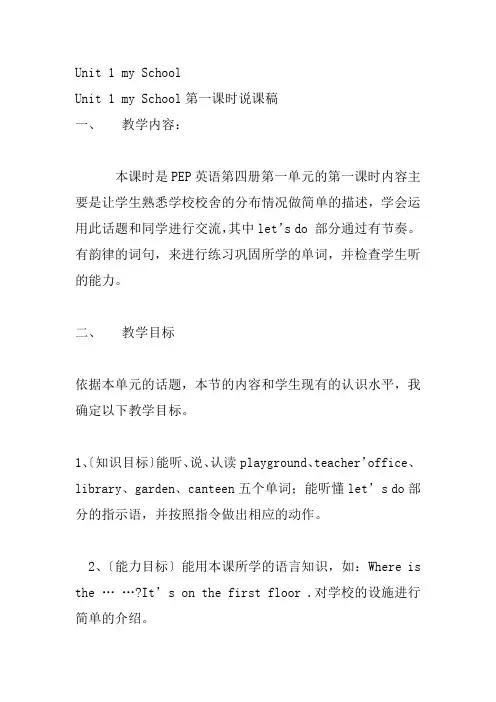
Unit 1 my SchoolUnit 1 my School第一课时说课稿一、教学内容:本课时是PEP英语第四册第一单元的第一课时内容主要是让学生熟悉学校校舍的分布情况做简单的描述,学会运用此话题和同学进行交流,其中let’s do 部分通过有节奏。
有韵律的词句,来进行练习巩固所学的单词,并检查学生听的能力。
二、教学目标依据本单元的话题,本节的内容和学生现有的认识水平,我确定以下教学目标。
1、〔知识目标〕能听、说、认读playground、teacher’office、library、garden、canteen五个单词;能听懂let’s do部分的指示语,并按照指令做出相应的动作。
2、〔能力目标〕能用本课所学的语言知识,如:Where is the ……?It’s on the first floor .对学校的设施进行简单的介绍。
3、〔情感目标〕培养学生的动手能力和创作才能,爱护自己学校的情感。
三、教学准备多媒体课件和图片四、四、教学重、难点重点是听、说、认读本节课时的主要单词:playground、teacher’ office、library、garden、canteen;难点是新单词library中辅音连缀的发音。
五、教学过程﹝一﹞激趣导入:Welcome back to school.I am very glad to meet you.1、A Song: our school.2、A game: 逐步出现图片的一小部分,请学生猜。
〔设计思路〕在歌声中开始新课,使课堂气氛愉快、活跃、、。
在游戏中复习旧单词flower、book、noodles、teacher’s desk、football、又不失时机地加入water the flower /reed a story book/ eat some noodles/play football/hand in the homework 的教学。
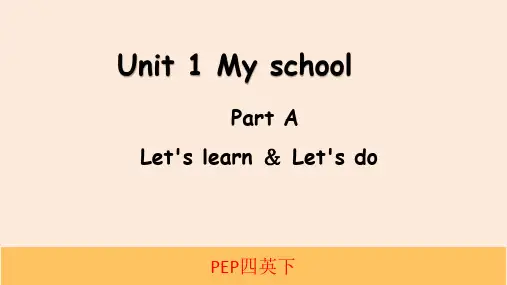
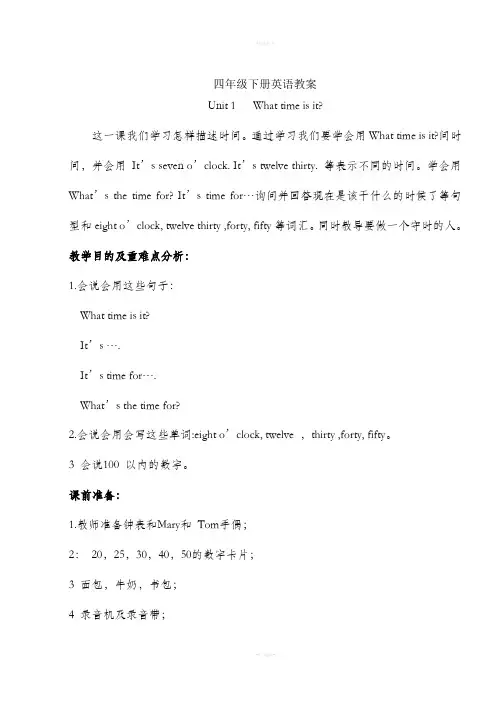
四年级下册英语教案Unit 1 What time is it?这一课我们学习怎样描述时间。
通过学习我们要学会用What time is it?问时间,并会用It’s seven o’clock. It’s twelve thirty. 等表示不同的时间。
学会用What’s the time for? It’s time for…询问并回答现在是该干什么的时候了等句型和eight o’clock, twelve thirty ,forty, fifty等词汇。
同时教导要做一个守时的人。
教学目的及重难点分析:1.会说会用这些句子:What time is it?It’s ….It’s time for….What’s the time for?2.会说会用会写这些单词:eight o’clock, twelve ,thirty ,forty, fifty。
3 会说100 以内的数字。
课前准备:1.教师准备钟表和Mary和Tom手偶;2:20,25,30,40,50的数字卡片;3 面包,牛奶,书包;4 录音机及录音带;5 早饭,上学,上课,午饭的单词卡片;6. 学生准备钟表,纸表盘和水彩笔。
教学过程:1.热身(Warming up)老师拿出钟表,利用Mary和Tom手偶进行对话引出本课话题。
A: Hi, what’s this ?B: Oh. It’s a clock.A: What time is it?B: It’s seven fifteenA: What’s the time for?B: It’s time for breakfast.A: Now what time is it?B: It’s eleven forty-five. It’s time for lunch.2. 新课展示(New Presentation)老师通过钟表和数字卡片讲解本课重点句型What time is it? It’s seven o’clock. It’s twelve thirty .What’s the time for? It’s time for…及词汇eight o’clock, twelve,thirty ,forty, fifty。
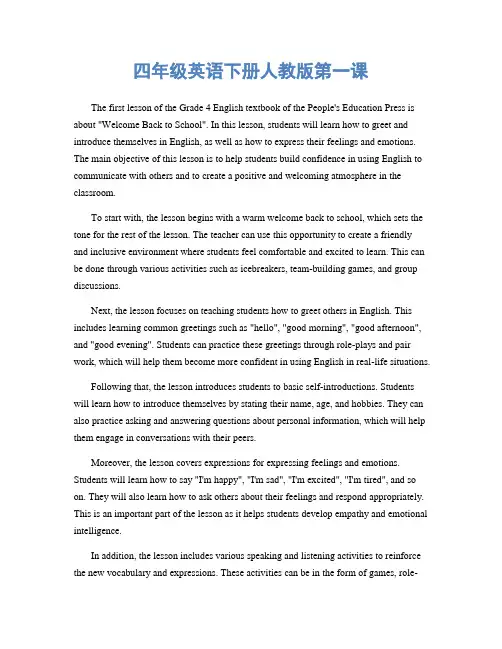
四年级英语下册人教版第一课The first lesson of the Grade 4 English textbook of the People's Education Press is about "Welcome Back to School". In this lesson, students will learn how to greet and introduce themselves in English, as well as how to express their feelings and emotions. The main objective of this lesson is to help students build confidence in using English to communicate with others and to create a positive and welcoming atmosphere in the classroom.To start with, the lesson begins with a warm welcome back to school, which sets the tone for the rest of the lesson. The teacher can use this opportunity to create a friendly and inclusive environment where students feel comfortable and excited to learn. This can be done through various activities such as icebreakers, team-building games, and group discussions.Next, the lesson focuses on teaching students how to greet others in English. This includes learning common greetings such as "hello", "good morning", "good afternoon", and "good evening". Students can practice these greetings through role-plays and pair work, which will help them become more confident in using English in real-life situations.Following that, the lesson introduces students to basic self-introductions. Students will learn how to introduce themselves by stating their name, age, and hobbies. They can also practice asking and answering questions about personal information, which will help them engage in conversations with their peers.Moreover, the lesson covers expressions for expressing feelings and emotions. Students will learn how to say "I'm happy", "I'm sad", "I'm excited", "I'm tired", and so on. They will also learn how to ask others about their feelings and respond appropriately. This is an important part of the lesson as it helps students develop empathy and emotional intelligence.In addition, the lesson includes various speaking and listening activities to reinforce the new vocabulary and expressions. These activities can be in the form of games, role-plays, and pair work, which will provide students with ample opportunities to practice using English in a fun and interactive way.Furthermore, the lesson encourages students to use English in their daily interactions with teachers and classmates. This can be achieved through classroom routines, such as greeting the teacher in English at the beginning of the class, or sharing their feelings and emotions during group discussions.To sum up, the first lesson of the Grade 4 English textbook of the People's Education Press, "Welcome Back to School", focuses on building students' confidence in using English to greet others, introduce themselves, and express their feelings and emotions. By creating a positive and welcoming atmosphere in the classroom and providing ample opportunities for practice, students will be able to develop their English communication skills and feel more comfortable using English in their daily lives. This lesson sets a strong foundation for future language learning and lays the groundwork for a supportive and inclusive learning environment.。
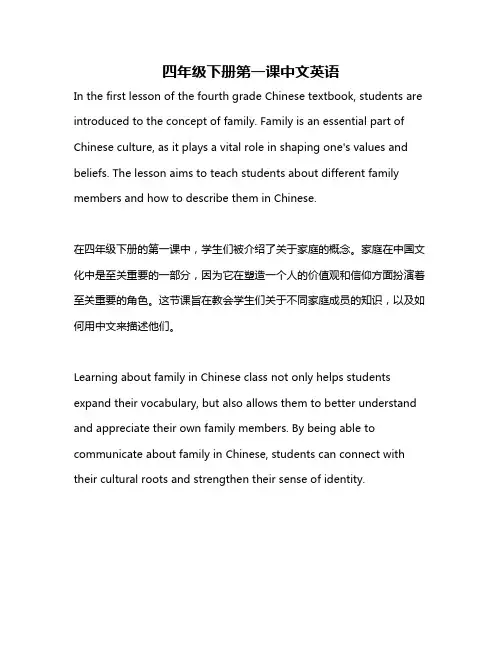
四年级下册第一课中文英语In the first lesson of the fourth grade Chinese textbook, students are introduced to the concept of family. Family is an essential part of Chinese culture, as it plays a vital role in shaping one's values and beliefs. The lesson aims to teach students about different family members and how to describe them in Chinese.在四年级下册的第一课中,学生们被介绍了关于家庭的概念。
家庭在中国文化中是至关重要的一部分,因为它在塑造一个人的价值观和信仰方面扮演着至关重要的角色。
这节课旨在教会学生们关于不同家庭成员的知识,以及如何用中文来描述他们。
Learning about family in Chinese class not only helps students expand their vocabulary, but also allows them to better understand and appreciate their own family members. By being able to communicate about family in Chinese, students can connect with their cultural roots and strengthen their sense of identity.在中文课上学习家庭不仅可以帮助学生扩展他们的词汇量,还可以让他们更好地了解和欣赏自己的家庭成员。
通过能够用中文交流家庭,学生们可以与他们的文化根源建立联系,增强自我认同感。
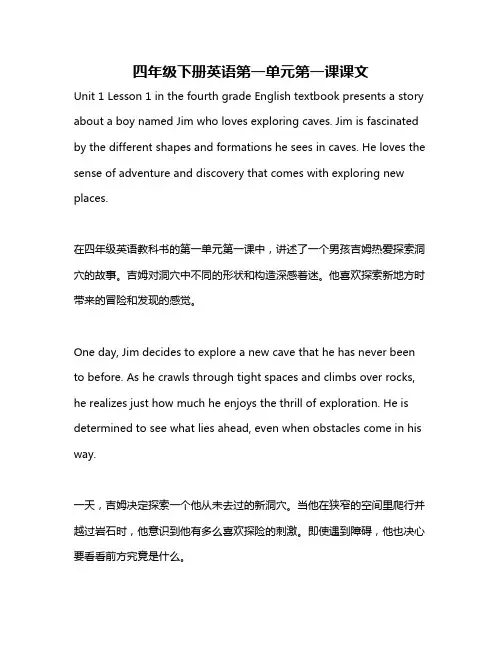
四年级下册英语第一单元第一课课文Unit 1 Lesson 1 in the fourth grade English textbook presents a story about a boy named Jim who loves exploring caves. Jim is fascinated by the different shapes and formations he sees in caves. He loves the sense of adventure and discovery that comes with exploring new places.在四年级英语教科书的第一单元第一课中,讲述了一个男孩吉姆热爱探索洞穴的故事。
吉姆对洞穴中不同的形状和构造深感着迷。
他喜欢探索新地方时带来的冒险和发现的感觉。
One day, Jim decides to explore a new cave that he has never been to before. As he crawls through tight spaces and climbs over rocks, he realizes just how much he enjoys the thrill of exploration. He is determined to see what lies ahead, even when obstacles come in his way.一天,吉姆决定探索一个他从未去过的新洞穴。
当他在狭窄的空间里爬行并越过岩石时,他意识到他有多么喜欢探险的刺激。
即使遇到障碍,他也决心要看看前方究竟是什么。
However, Jim soon encounters a narrow passage that he cannot squeeze through. He feels disappointed and frustrated, but instead of giving up, he decides to find another way around. This shows his determination and perseverance in the face of challenges.然而,吉姆很快遇到了一个他无法穿过的狭窄通道。
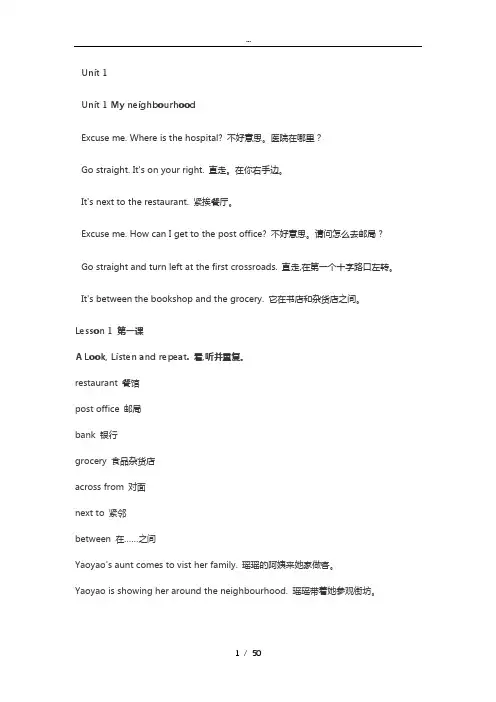
Unit 1Unit 1 My neighbourhoodExcuse me. Where is the hospital? 不好意思。
医院在哪里?Go straight. It's on your right. 直走。
在你右手边。
It's next to the restaurant. 紧挨餐厅。
Excuse me. How can I get to the post office? 不好意思。
请问怎么去邮局?Go straight and turn left at the first crossroads. 直走,在第一个十字路口左转。
It's between the bookshop and the grocery. 它在书店和杂货店之间。
Lesson 1 第一课A Look, Listen and repeat. 看,听并重复。
restaurant 餐馆post office 邮局bank 银行grocery 食品杂货店across from 对面next to 紧邻between 在……之间Yaoyao's aunt comes to vist her family. 瑶瑶的阿姨来她家做客。
Yaoyao is showing her around the neighbourhood. 瑶瑶带着她参观街坊。
"Look, this is a post office. Our school is next to it." "看,这有一间邮局。
我们学校在它旁边。
""Oh, I see. What's that?" "哦,我看到啦。
那是什么?""That's a restaurant. We can eat Beijing duck there. "那是一家餐厅。
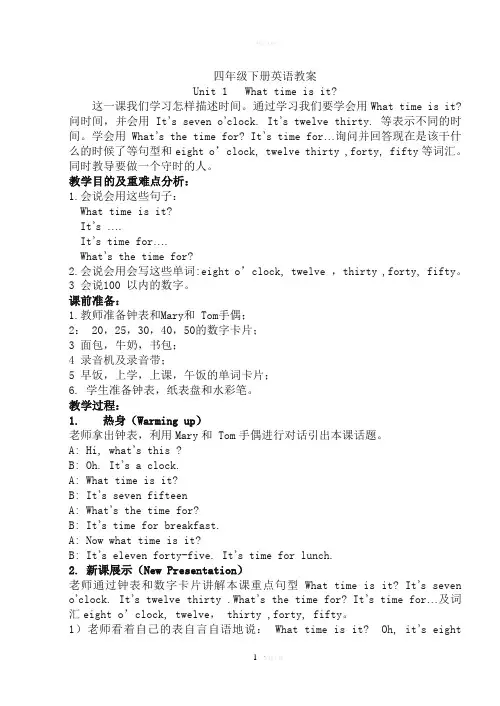
四年级下册英语教案Unit 1 What time is it?这一课我们学习怎样描述时间。
通过学习我们要学会用What time is it?问时间,并会用 It’s seven o’clock. It’s twelve thirty. 等表示不同的时间。
学会用What’s the time for? It’s time for…询问并回答现在是该干什么的时候了等句型和eight o’clock, twelve thirty ,forty, fifty等词汇。
同时教导要做一个守时的人。
教学目的及重难点分析:1.会说会用这些句子:What time is it?It’s ….It’s time for….What’s the time for?2.会说会用会写这些单词:eight o’clock, twelve ,thirty ,forty, fifty。
3 会说100 以内的数字。
课前准备:1.教师准备钟表和Mary和 Tom手偶;2: 20,25,30,40,50的数字卡片;3 面包,牛奶,书包;4 录音机及录音带;5 早饭,上学,上课,午饭的单词卡片;6. 学生准备钟表,纸表盘和水彩笔。
教学过程:1.热身(Warming up)老师拿出钟表,利用Mary和 Tom手偶进行对话引出本课话题。
A: Hi, what’s this ?B: Oh. It’s a clock.A: What time is it?B: It’s seven fifteenA: What’s the time for?B: It’s time for breakfast.A: Now what time is it?B: It’s eleven forty-five. It’s time for lunch.2. 新课展示(New Presentation)老师通过钟表和数字卡片讲解本课重点句型What time is it? It’s seven o’clock. It’s twelve thirty .What’s the time for? It’s time for…及词汇eight o’clock, twelve, thirty ,forty, fifty。
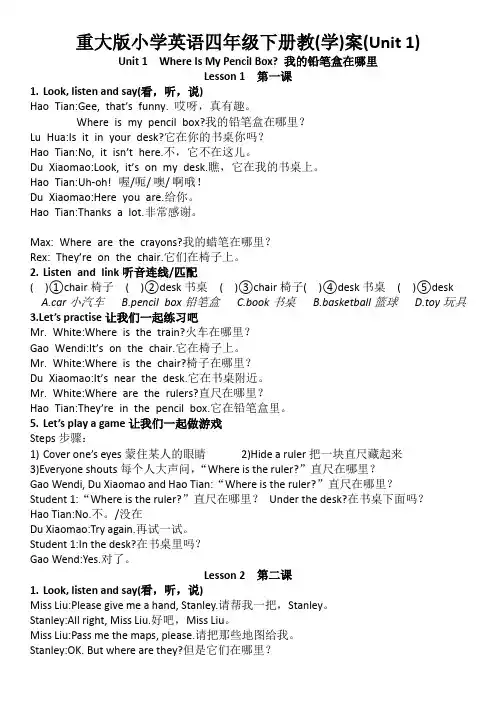
重大版小学英语四年级下册教(学)案(Unit 1)Unit 1 Where Is My Pencil Box? 我的铅笔盒在哪里Lesson 1 第一课1.Look, listen and say(看,听,说)Hao Tian:Gee, that’s funny. 哎呀,真有趣。
Where is my pencil box?我的铅笔盒在哪里?Lu Hua:Is it in your desk?它在你的书桌你吗?Hao Tian:No, it isn’t here.不,它不在这儿。
Du Xiaomao:Look, it’s on my desk.瞧,它在我的书桌上。
Hao Tian:Uh-oh!喔/呃/ 噢/ 啊哦!Du Xiaomao:Here you are.给你。
Hao Tian:Thanks a lot.非常感谢。
Max: Where are the crayons?我的蜡笔在哪里?Rex: They’re on the chair.它们在椅子上。
2.Listen and link听音连线/匹配( )①chair椅子( )②desk书桌( )③chair椅子( )④desk书桌( )⑤deskA.car小汽车B.pencil box铅笔盒C.book书桌 B.basketball篮球D.toy玩具3.Let’s practise让我们一起练习吧Mr. White:Where is the train?火车在哪里?Gao Wendi:It’s on the chair.它在椅子上。
Mr. White:Where is the chair?椅子在哪里?Du Xiaomao:It’s near the desk.它在书桌附近。
Mr. White:Where are the rulers?直尺在哪里?Hao Tian:They’re in the pencil box.它在铅笔盒里。
5.Let’s play a game让我们一起做游戏Steps步骤:1)Cover one’s eyes蒙住某人的眼睛2)Hide a ruler把一块直尺藏起来3)Everyone shouts每个人大声问,“Where is the ruler?”直尺在哪里?Gao Wendi, Du Xiaomao and Hao Tian:“Where is the ruler?”直尺在哪里?Student 1:“Where is the ruler?”直尺在哪里?Under the desk?在书桌下面吗?Hao Tian:No.不。
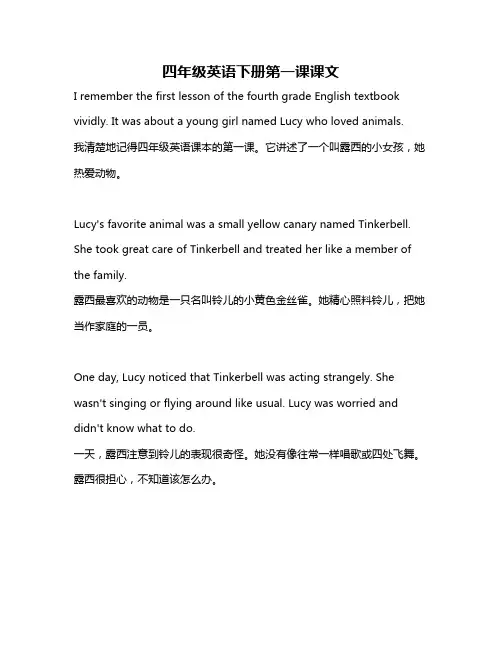
四年级英语下册第一课课文I remember the first lesson of the fourth grade English textbook vividly. It was about a young girl named Lucy who loved animals.我清楚地记得四年级英语课本的第一课。
它讲述了一个叫露西的小女孩,她热爱动物。
Lucy's favorite animal was a small yellow canary named Tinkerbell. She took great care of Tinkerbell and treated her like a member of the family.露西最喜欢的动物是一只名叫铃儿的小黄色金丝雀。
她精心照料铃儿,把她当作家庭的一员。
One day, Lucy noticed that Tinkerbell was acting strangely. She wasn't singing or flying around like usual. Lucy was worried and didn't know what to do.一天,露西注意到铃儿的表现很奇怪。
她没有像往常一样唱歌或四处飞舞。
露西很担心,不知道该怎么办。
Lucy decided to take Tinkerbell to the vet to see if there was something wrong. The vet examined Tinkerbell carefully and discovered that she was sick.露西决定带铃儿去看兽医,看看是否有什么问题。
兽医仔细检查了铃儿,发现她生病了。
The vet prescribed some medicine for Tinkerbell and advised Lucy to give her plenty of rest and fresh water. Lucy followed the vet's instructions faithfully and nursed Tinkerbell back to health.兽医为铃儿开了一些药,并建议露西给她充足的休息和新鲜水。
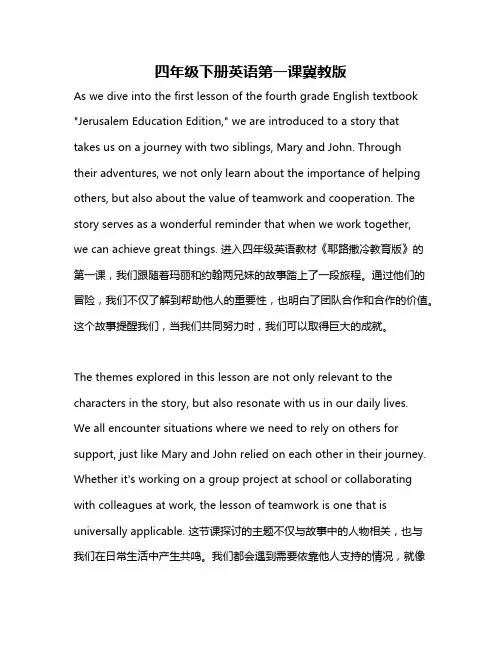
四年级下册英语第一课冀教版As we dive into the first lesson of the fourth grade English textbook "Jerusalem Education Edition," we are introduced to a story that takes us on a journey with two siblings, Mary and John. Throughtheir adventures, we not only learn about the importance of helping others, but also about the value of teamwork and cooperation. The story serves as a wonderful reminder that when we work together,we can achieve great things. 进入四年级英语教材《耶路撒冷教育版》的第一课,我们跟随着玛丽和约翰两兄妹的故事踏上了一段旅程。
通过他们的冒险,我们不仅了解到帮助他人的重要性,也明白了团队合作和合作的价值。
这个故事提醒我们,当我们共同努力时,我们可以取得巨大的成就。
The themes explored in this lesson are not only relevant to the characters in the story, but also resonate with us in our daily lives.We all encounter situations where we need to rely on others for support, just like Mary and John relied on each other in their journey. Whether it's working on a group project at school or collaborating with colleagues at work, the lesson of teamwork is one that is universally applicable. 这节课探讨的主题不仅与故事中的人物相关,也与我们在日常生活中产生共鸣。
四年级下册英语-Unit1 Lesson 1 How are you 冀教版前言四年级下册英语-Unit1 Lesson1 How are you,是冀教版小学英语课程的第一课,学习此课程对于学生的英语学习打下很好的基础。
在学习这个课程的过程中,学生将学会询问和回答他人的身体状况,进一步发展英语语言能力。
内容本课程主要包括三个部分:1.自我介绍通过学习本课程,学生可以熟练地使用“Hello, I’m (student’s name)”这句常用句式进行自我介绍。
并且学习如何询问别人的姓名和如何回答。
2.询问和回答身体状况通过学习本课程,学生可以了解到如何使用“How are you?”这句常用的问候语,以及如何正确回答。
学生可以借此了解一些简单的身体器官和病症的词汇。
3.小结通过本课程,学生将能够在日常生活中更加自信的使用英语进行简单的交流,同时通过此课程的学习能够促进学生的语言沟通和交往能力的提升。
学习方法1.听读模仿在学习本课程的时候,学生可以先听老师或者录音机的发音。
然后再进行自己的朗读,进行模仿。
2.实践输出在学习本课程的时候,学生可以进行一些口语练习。
可以自己和其他同学组成小组进行英语会话,或者请家长进行简单的英语对话。
3.阅读扩展在学习本课程的时候,学生可以通过阅读英语原版的儿童书籍,来扩充自己的词汇量,提高读写能力。
总结四年级下册英语-Unit1 Lesson1 How are you,是冀教版小学英语课程的第一课。
通过学习本课程,学生可以学习到自我介绍、询问和回答身体状况等基本英语表达方式。
通过不断地练习,学生能够提高自己的英语听说能力,并且在日常生活中更加自信地运用英语进行交际。
同时,在学习本课程的同时,学生也可以进一步提高语言沟通和交往能力。
《精通小学英语》四年级下册Unit1 Lesson1(教学设计)一、教学目标1、知识与技能:(1)能够正确听、说、认、读单词:home, bedroom, bed.(2)能够听、说、读、写单词:desk, chair.(3)能够正确理解、说出:Look at the bedroom. There is a...等句型,并且能在真实语境中进行交流、运用。
2、过程与方法:(1)能够运用本课的句型,介绍自己的卧室,将所学语言运用到实际生活当中。
(2)帮助学生在完成任务的过程中,积极运用各种感官参与课堂教学的各个活动,通过教师提供的一个个场景,不断在真实的语境中体验交流,并且拓展应用。
(3)通过媒体视听提高学生的学习兴趣,通过创设情境调动学生的学习积极性,整个课堂教学活动贯穿激励性评价。
3、情感态度与价值观:(1)通过本课的学习,培养学生爱家的积极情感。
(2)通过课堂活动,激发学生学习英语的兴趣,增强学生的参与意识。
(3)通过小组活动,引导学生积极与他人合作,共同完成学习任务,并在成功中体验学习的乐趣。
教学重点:学习有关家居用品的单词教学难点:掌握There be 句型的表述二、内容分析:本课是四年级下册第一单元的第一课,主要是LiYan 邀请好朋友Kate到自己家做客并重点介绍卧室中物品的情景,引出要学习的功能句型。
本课的重点单词对于学生来说并不陌生,都是平日里经常接触和看到的,但是重点句型There is a...是学生刚刚接触的,因此在教学中,我通过设置生动的教学活动及教学情境,激发学生的学习兴趣,使学生在愉快的学习氛围中很自然地学会句型,最终引导学生能够运用目标语言进行交际。
三、学情分析本课的授课对象为四年级的学生,他们活泼好动,纯真可爱。
上课时能够专心听讲。
积极踊跃地大声地说英语。
但是也有个别学生对英语学习兴趣不是很浓,造成上课时精神不集中。
针对以上问题,在课堂教学各个环节中,我以学生为主体,让师生、生生之间的互动更加多样化,努力创设和谐的教学环境,给学生更多探究的机会,用行之有效的方法,提升课堂教学的高效性。
四年级英语下册第一课Four Year English Book 2 Lesson 1: My FamilyIn this lesson, students will learn about family members and how to introduce them. The lesson begins with a warm-up activity where students are asked to draw a picture of their family and label each member. Afterward, the teacher introduces new vocabulary words such as mother, father, brother, sister, grandmother, and grandfather. Students practice saying and writing sentences about their family members using the new vocabulary.Next, the teacher introduces the concept of possessive pronouns (my, your, his, her, our, their) and how to use them to talk about family members. Students practice with worksheets and through pair work activities.To reinforce the lesson, students are asked to create a family tree for themselves and present it to the class. This not only helps students practice their new vocabulary and grammar, but also encourages them to share more about their family and learn about their classmates' families.Overall, this lesson lays the groundwork for students to talk about their family members and use possessive pronouns correctly. It also fosters a sense of community within theclassroom as students share and learn about each other's families.。
四年级下册的英语第1课以下是人教版四年级英语下册第一课的内容:- Our School- Look! That is the playground.- This is the canteen.- This is our school.- Oh! No!- This is the library!- Sorry!- Is this the computer room?- No, this is the teacher's office.- Is that the teacher's office, too?- No, that is the library.- Let's Learn- playground- teacher's office- library- garden- canteen- Let's Do- Go to the garden.- Water the flowers.- Go to the library.- Read a story-book.- Go to the canteen.- Eat some noodles.- Go to the teacher's office.- Hand in the homework.- Go to the playground.- Play football.- Let's Talk- Welcome to our school!- This is the teacher's office.- That is my classroom.- How many students are there in your class? - Forty-five.- Do you have a library?- Yes.- Do you have lunch at school?- Yes!- The canteen is on the first floor.- This way, please.- Look! This is our playground.- Oh, your school is beautiful.- Let's Play- That is the canteen!- Read and Write- We have a new computer room!- Oh! Let's go there.- Look, one board, two fans, four lights ... - And ten new computers!- I like this one.- Sorry. This is my computer!- That is your computer.- Oh-oh.。